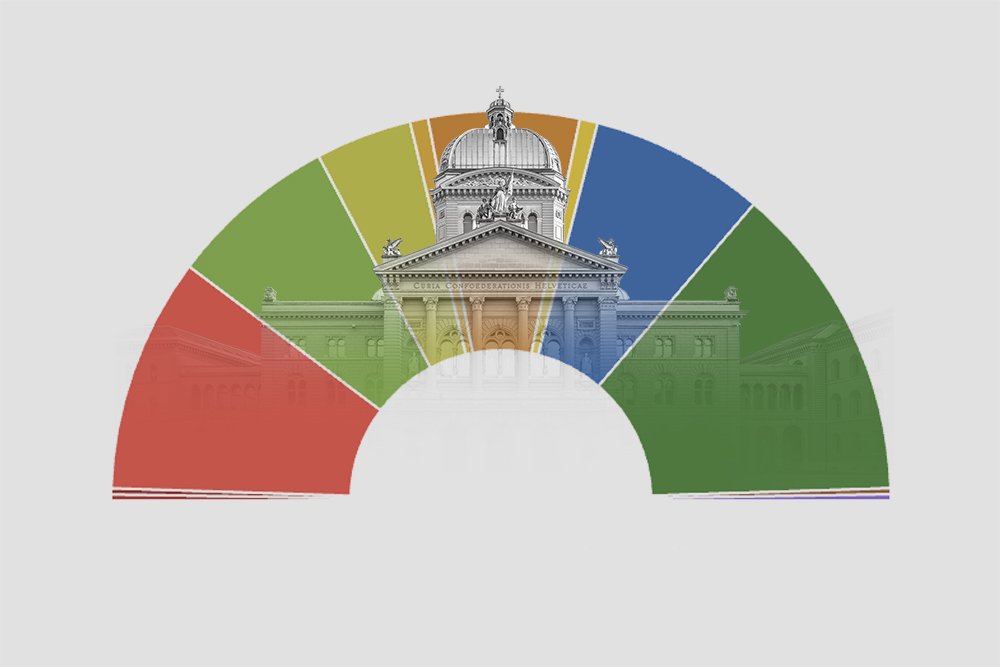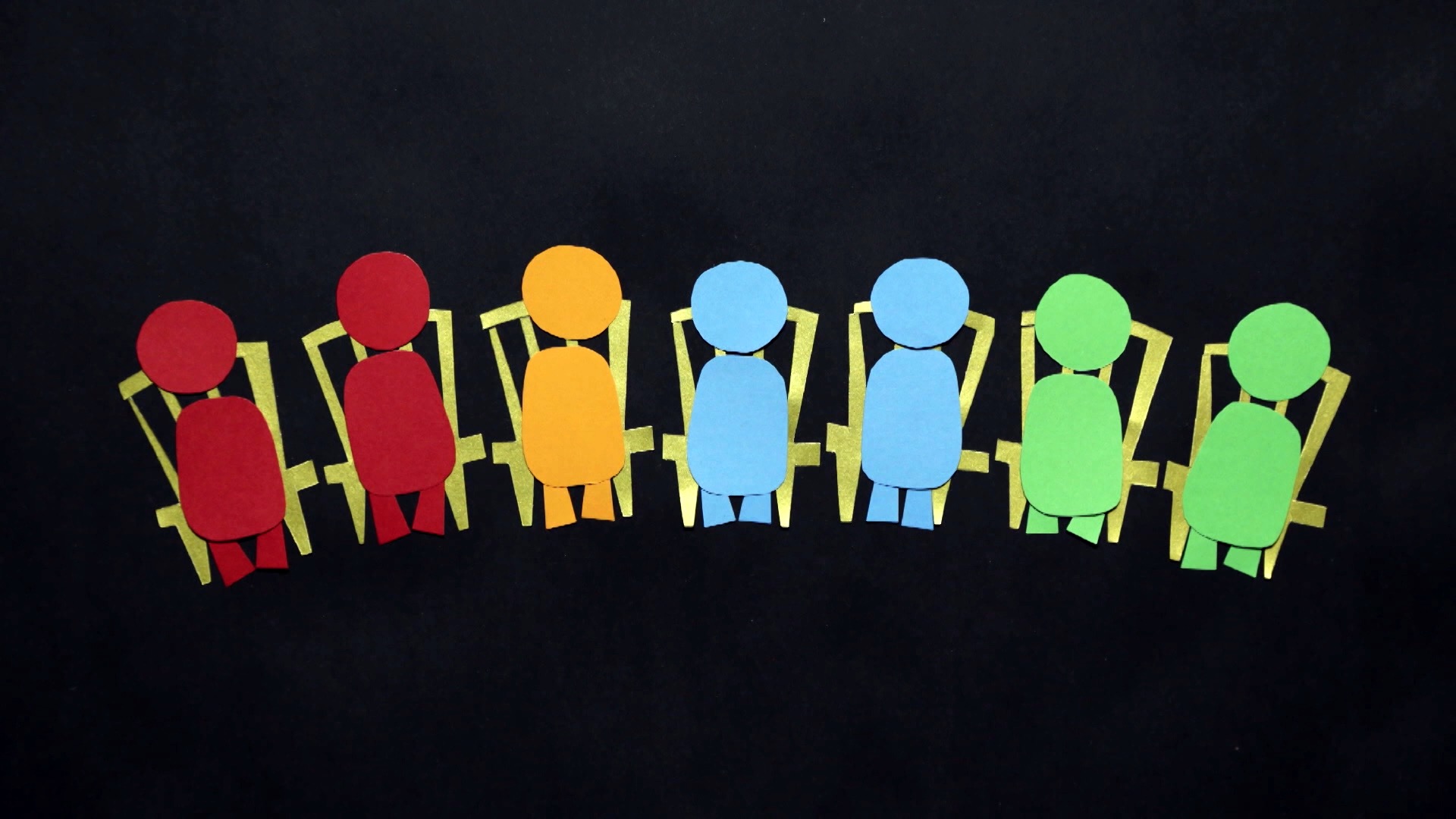Eight takeaways from the 2023 federal elections in Switzerland

Environment-led politics struggled and migration drove the People Party’s success, the Centre Party overtakes the Radical-Liberals: these are the main takeaways from election Sunday in Switzerland. Our analysis.

More
Elections 2023: results
1) The green wave is a thing of the past
Environmental politics has lost its appeal, in Switzerland and elsewhere in Europe. The defeat of the Green Party and the Liberal Green Party echoes the difficulties experienced by green parties within the European Union. According to polls, they are also likely to suffer a setback in the European elections in June 2024.
During the 2019 election campaign, green themes had dominated public debate and provoked great mobilisation on the left of the political spectrum, notably with the organisation of climate strikes. This wasn’t the case this year.
The trend seems paradoxical at a time when extreme weather events are multiplying and climate disruption remains one of Switzerland’s main concerns. However, the fact that it’s hot in October is not the primary concern of the population, a growing number of whom are struggling to make ends meet. And the urgency of climate change may also be creating a sense of powerlessness among the electorate.
In the end, environmental groups failed to make climate change “sexy”. On the contrary, they have suffered from the hard-hitting actions of radical climate activists, who provoked confusion and even anger among a large part of the population.
2) The People’s Party successfully capitalised on its favourite theme
The images of the Italian island of Lampedusa, confronted with a huge influx of migrants from North Africa, went around the world and brought asylum policy back to the forefront during this election year. This has been a boon for the right-wing Swiss People’s Party, which has focused its campaign on its favourite theme, the fight against immigration.
With the rise in asylum applications (12,188 between the beginning of January and the end of June, or +43% compared to 2022), in addition to the presence of 65,000 refugees from Ukraine, the Swiss People’s Party was able to capitalise on the growing concerns of part of the population.

More
Elections 2023: Swiss parliament shifts to the right
Brandishing the spectre of a Switzerland with ten million inhabitants on its campaign posters, the People’s Party didn’t mince its words, drawing criticismExternal link from the Federal Commission against Racism. Nonetheless, this very clear discourse had a mobilising effect on the party’s base at a time of international insecurity.
The People’s Party also found an ideal scapegoat in the new Justice Minister Elisabeth Baume-Schneider, a Social Democrat. This winning tactic, already tried and tested several times in the past, enabled the party to erase its 2019 defeat and come close again this Sunday to its 2015 record level.
3) The Radical-Liberals failed to convince on immigration
Under the slogan “firm but fair”, the Radical-Liberal Party also made immigration policy one of its priority themes during the election campaign. In contrast to the People’s Party, the Radical-Liberals insisted on the need to maintain the free movement of people to attract skilled European workers, while hammering home its desire to combat “social tourism” and “asylum chaos”.
With this stance and its surprisingly virulent attacks on Elisabeth Baume-Schneider, the Radical-Liberals did not want to leave the field open to the isolationist right on this issue. The fact remains, however, that voters clearly gave more credence to the solutions proposed by the People’s Party.
At a time of full employment, the Radical-Liberals also lacked another strong mobilising theme. As for the mismanagement of Credit Suisse, taken over by its rival UBS, this certainly helped to damage the image of the Radical-Liberals, historically closely linked to the Swiss financial centre.
As a result, the founding party of modern Switzerland lost slightly in these elections and failed to reverse its long-term decline. Whereas in the early 1980s the Radical-Liberals attracted almost a quarter of the electorate, today it convinced just over one in seven voters.
4) The Social Democrats benefited only slightly from social discontent
For its 2023 election campaign, the Social Democrats went back to basics: the fight for household purchasing power. The return of inflation and the announcement of a substantial rise in health insurance premiums just one month before the federal elections put social issues back at the heart of the stakes. The Social Democrats were thus able to win back a few votes from the Greens in the left-wing camp.
But while health insurance premiums are once again the number-one concern of the Swiss, ahead of immigration, the Social Democrats ultimately profited only marginally from the discontent rumbling among some middle-class voters.
Unlike the People’s Party, on the issue of immigration and the Greens on that of global warming, the Social Democratic Party is not necessarily considered the most competent political force in the complex field of health insurance.
In a country that relies heavily on individual freedom, the proposals coming out of the Social Democratic Party for a single health insurance scheme and income-based premiums are seen as excessive nationalisation by the majority of voters. The Social Democrats may have a loyal following on the left, but it is still struggling to recruit beyond its traditional territories.
5) The rise of the Centre challenges the magic formula
Even if it isn’t a major upset, this is a historic moment in Swiss politics: the Centre has overtaken the Radical-Liberals as the country’s third political force in the House of Representatives, and is thus – at least mathematically – entitled to a second seat on the Federal Council. This is in accordance with the “magic formula” employed since 1959, whereby the three largest parties each hold two seats in the Swiss government, and the fourth holds one seat.
Does this mean that Swiss Foreign Minister Ignazio Cassis, from the Radical-Liberal Party, who ranks lowest in the popularity rankings of federal government ministers, has to fear for his time in office? Not at all, since it is also a principle that sitting members of the Federal Council may not be removed from office; this unwritten rule has only been broken three times in the last 175 years.
The Christian Democratic Party, of which the Centre is an offshoot, took advantage of this four years ago, when the Greens narrowly overtook it in terms of votes. In 2021, the Christian Democratic Party merged with the Conservative Democratic Party under the new name of the Centre and has put its house in order.
One thing is certain: in the current constellation, the Centre will be even more enterprising and establish itself as the undisputed political force at the centre of the political spectrum. Under the leadership of party president Gerhard Pfister, it has shed its proverbial low profile. In the House of Representatives, it remains an important coalition partner for the Radical-Liberals and the People’s Party, which between them don’t have a majority. In the Senate, it should remain the most important force.
6) Despite global crises: the elections didn’t draw crowds to the polls
Switzerland, a model democracy, is tired of politics. This is how we might analyse the turnout at these elections. At 46.6%, voter turnout is admittedly slightly higher than in 2019 (45%). But as has always been the case in recent decades, more than half the electorate failed to turn out at the polls. And this at a time when the world is going through one crisis after another and purchasing power is declining in Switzerland.

More
Our global journalists on the stakes of Swiss elections
How can we explain the silence of the majority of the electorate? Perhaps the main cause of abstention lies in the inertia inherent in the Swiss system. When a party gains 3%, it’s almost considered a political earthquake. But the balance of power almost always remains unchanged.
And if parliament, whether a little to the left or a little to the right, were to take an unpleasant decision, abstentionists feel they could call it to order with a referendum.
7) No great debate of ideas
The electoral campaign was a far cry from the political flashpoints and intense fighting seen abroad. The parties rolled out their campaign slogans based on their preferred subjects, without encroaching too much on their opponents’ turf. Nor were there any real in-depth debates on the major political issues of the day. The fall of Credit Suisse and relations with the European Union were absent from the campaign.
However, this is not an exception, but rather the rule in peaceful Switzerland. With the exception of lively debates on immigration in 2015 and the Fukushima nuclear accident in 2011, campaigns are often bland. This is an inherent feature of Swiss direct democracy: with federal votes taking place four times a year, the parties have plenty of other opportunities to explain their positions on various issues.
Nevertheless, as is the case every four years, this election campaign enabled the parties to forge links with the public. Each candidate had to give his or her all and shake hundreds, if not thousands, of hands in the hope of retaining or winning a seat in Bern. A rare and precious moment, even in a Swiss democracy often held up as a model of proximity between the people and their representatives.
8) The Swiss Abroad, an increasingly courted electorate
More than 220,000 Swiss Abroad are registered to vote. More and more expatriates return home at some point. As such, it is legitimate for them to take part in votes and elections.
This electorate is growing fast: it has more than tripled in the last 30 years, and has reached a size that would theoretically allow it to occupy six seats in the House of Representatives. As a result, parties are increasingly vying for the votes of the Swiss Abroad. The People’s Party, the Social Democrats, the Radical-Liberals and the Centre have been active in the diaspora and have international sections. In the past, these have helped some candidates secure the votes they needed to be elected.

More
The Swiss parliament for beginners
The Liberal Green Party is the last of the six major parties to set up an international section for these elections. This choice was dictated by the fact that the political profile of the Swiss abroad largely matches that of the most recent political party: on average, they are progressive on environmental issues and advocate for a liberal economy and an open foreign policy.
Since the Swiss Abroad vote more according to values, they may also be more loyal to a particular party. In this election year, they were the subject of a good number of interventions in parliament. There was a real race to win their favour.
Adapted from French by Jessica Davis Plüss. Edited by Mark Livingston

In compliance with the JTI standards
More: SWI swissinfo.ch certified by the Journalism Trust Initiative











You can find an overview of ongoing debates with our journalists here . Please join us!
If you want to start a conversation about a topic raised in this article or want to report factual errors, email us at english@swissinfo.ch.